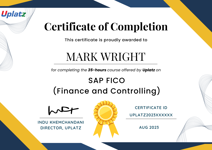
Chief Data and Analytics Officer (CDAO) Premium Career Track
Program consisting of courses to help you fulfil your dream in becoming a C-Level Executive (CDAO) in a top organization
Uplatz
Summary
- Uplatz Certificate of Completion - Free
Add to basket or enquire
Overview
Uplatz provides this intense Premium Career Track program on Chief Data and Analytics Officer (CDAO). It is a program covering all topics related to Data, Data Strategy, Data Analytics, Data Visualization, Data Science, Machine Learning, AI, Cloud Computing, Data Governance, and more, as self-paced video lectures. The program will help you pursue a career towards becoming a CDAO. You will be awarded Course Completion Certificate at the end of the course.
This Premium Career Track - Chief Data and Analytics Officer (CDAO) program by Uplatz includes the following courses:
- Business Intelligence and Data Analytics
- SAS BI
- Tableau
- Power BI
- Google Analytics (GA)
- Google Analytics 4 (GA4)
- SQL Programming with Microsoft SQL Server
- Talend
- Data Visualization in Python
- Data Visualization in R
- Data Science with Python
- Data Science with R
- Machine Learning
- Deep Learning Foundation
- Deep Learning with TensorFlow
- Deep Learning with Keras
- Generative AI Specialization
- SAP MDG (Master Data Governance)
- Cloud Computing Basics
- Microsoft Azure Fundamentals
A Chief Data and Analytics Officer (CDAO) is a senior executive responsible for overseeing an organization's data and analytics strategy, as well as its implementation. The role of a CDAO combines the responsibilities of a Chief Data Officer (CDO) and a Chief Analytics Officer (CAO) into one position.
Course media
Description
Key responsibilities of a CDAO typically include:
Data Strategy Development: Developing and implementing a comprehensive data strategy that aligns with the organization's business goals and objectives.
Data Governance: Establishing data governance frameworks to ensure data quality, integrity, security, and compliance with regulations.
Data Management: Managing data assets, including data architecture, data modeling, data integration, data warehousing, and master data management.
Data Analytics: Leading analytics initiatives to derive actionable insights from data, including techniques such as data mining, statistical analysis, machine learning, and predictive modeling.
Data Visualization: Communicating insights effectively to stakeholders through compelling visualizations and dashboards.
Big Data Technologies: Leveraging big data technologies and platforms to manage and analyze large volumes of structured and unstructured data.
Business Acumen: Understanding business needs and translating them into data-driven solutions that drive business value and foster innovation.
Leadership and Communication: Providing leadership and direction to data and analytics teams, and effectively communicating the value of data initiatives to stakeholders.
Collaboration: Collaborating with cross-functional teams to ensure alignment and integration of data and analytics initiatives with overall business strategy.
Ethical and Regulatory Compliance: Upholding ethical standards and ensuring compliance with data privacy regulations and industry standards in handling and analyzing data.
In summary, the CDAO plays a critical role in leveraging data and analytics as strategic assets to drive business growth, improve decision-making, and enhance competitive advantage.
The role of a Chief Data and Analytics Officer (CDAO) requires a unique blend of technical expertise, strategic vision, and leadership abilities. Here are the key skills required by a CDAO:
Data Strategy Development: Ability to formulate and execute a comprehensive data strategy that aligns with the organization's business objectives and drives value creation.
Data Governance: Proficiency in establishing data governance frameworks to ensure data quality, integrity, security, and compliance with regulations.
Data Management: Strong understanding of data management practices, including data architecture, data modeling, data integration, data warehousing, and master data management.
Data Analytics: Advanced analytical skills to derive insights from data using techniques such as data mining, statistical analysis, machine learning, and predictive modeling.
Data Visualization: Proficiency in data visualization tools and techniques to communicate insights effectively to stakeholders through compelling visualizations and dashboards.
Big Data Technologies: Familiarity with big data technologies and platforms (e.g., Hadoop, Spark, NoSQL databases) to manage and analyze large volumes of structured and unstructured data.
Cloud Computing: Understanding of cloud computing concepts and experience with cloud-based data storage, processing, and analytics platforms (e.g., AWS, Azure, Google Cloud).
Business Acumen: Ability to understand business needs and translate them into data-driven solutions that drive business value, improve decision-making, and foster innovation.
Leadership and Communication: Strong leadership and communication skills to effectively communicate the value of data and analytics initiatives, build consensus, and drive organizational change.
Collaboration: Ability to collaborate with cross-functional teams, including IT, business units, marketing, finance, and operations, to ensure alignment and integration of data and analytics initiatives with overall business strategy.
Project Management: Proficiency in project management methodologies to plan, execute, and oversee data and analytics projects and initiatives, ensuring they are delivered on time and within budget.
Ethical and Regulatory Compliance: Upholding high ethical standards and ensuring compliance with data privacy regulations and industry standards in handling and analyzing data.
Innovation: Creative thinking and innovation mindset to explore new technologies, methodologies, and approaches to extract maximum value from data assets and drive continuous improvement.
Vendor Management: Experience in vendor management and contract negotiation to select, onboard, and manage technology vendors and service providers effectively.
Change Management: Proficiency in change management methodologies to navigate organizational change, overcome resistance, and ensure successful adoption of data and analytics capabilities across the organization.
Who is this course for?
Everyone
Requirements
Passion and determination to make it to the top of the corporate ladder!
Career path
- Chief Data and Analytics Officer (CDAO)
- Chief Data Officer (CDO)
- Chief Data Architect
- Chief Analytics Officer
- Chief Technology Officer (CTO)
- Chief Information Officer (CIO)
- Chief Executive Officer (CEO)
- Enterprise Architect
- Engineering Lead
Questions and answers
Currently there are no Q&As for this course. Be the first to ask a question.
Certificates
Uplatz Certificate of Completion
Digital certificate - Included
Course Completion Certificate by Uplatz
Reviews
Currently there are no reviews for this course. Be the first to leave a review.
Legal information
This course is advertised on reed.co.uk by the Course Provider, whose terms and conditions apply. Purchases are made directly from the Course Provider, and as such, content and materials are supplied by the Course Provider directly. Reed is acting as agent and not reseller in relation to this course. Reed's only responsibility is to facilitate your payment for the course. It is your responsibility to review and agree to the Course Provider's terms and conditions and satisfy yourself as to the suitability of the course you intend to purchase. Reed will not have any responsibility for the content of the course and/or associated materials.



